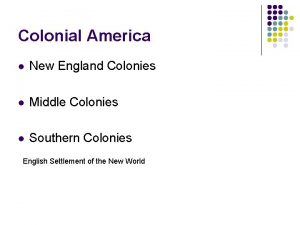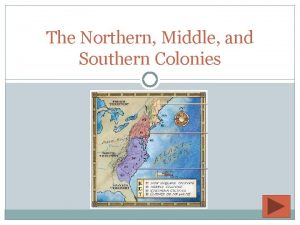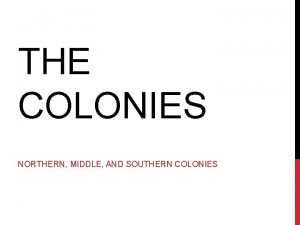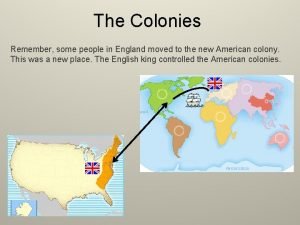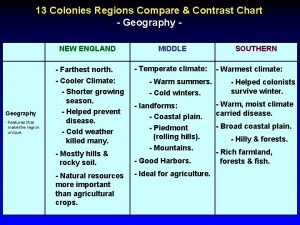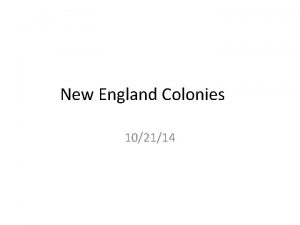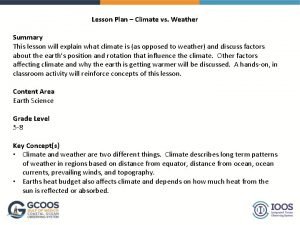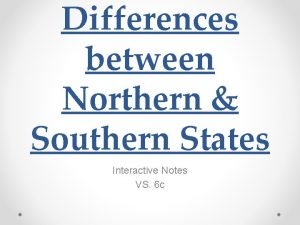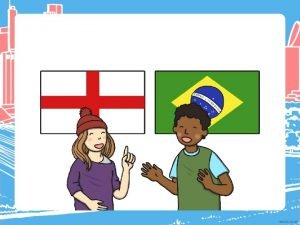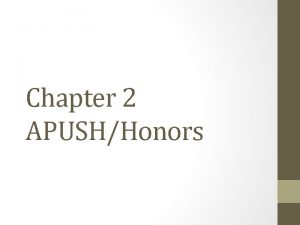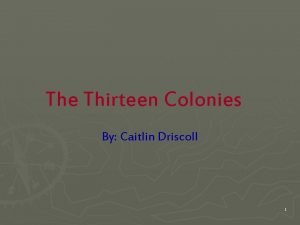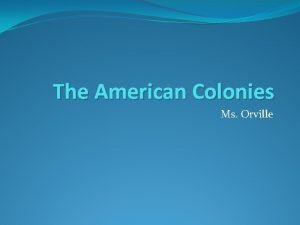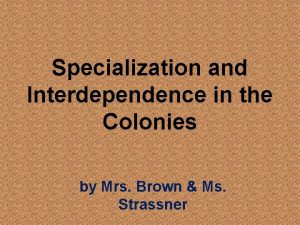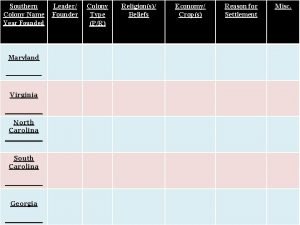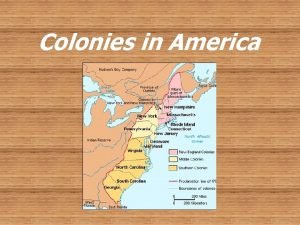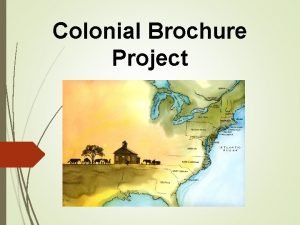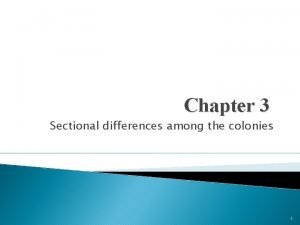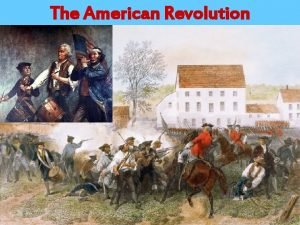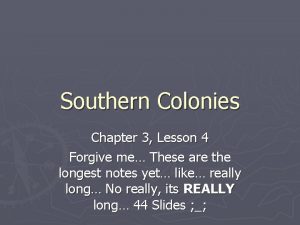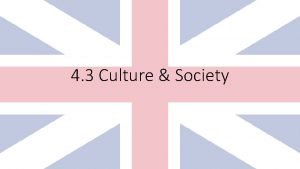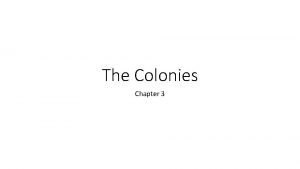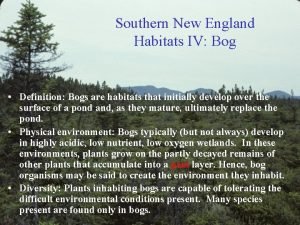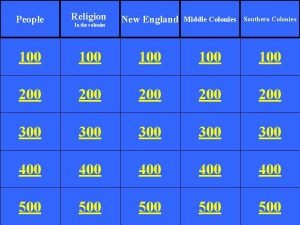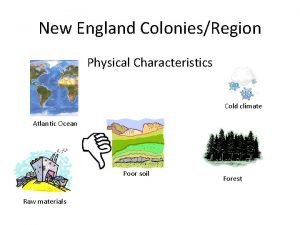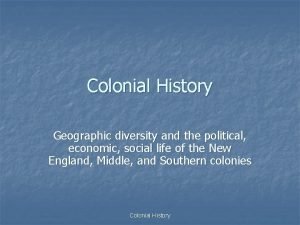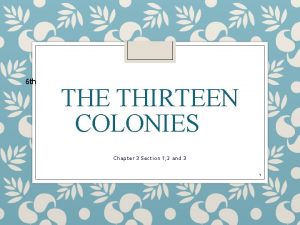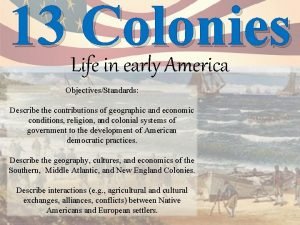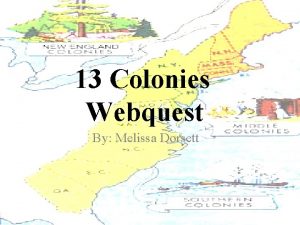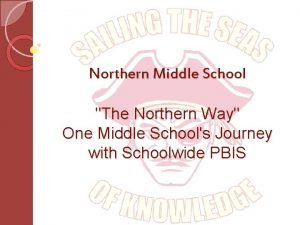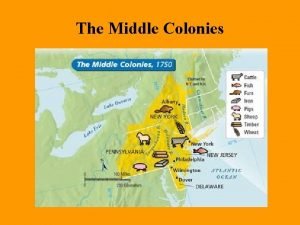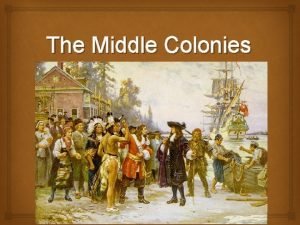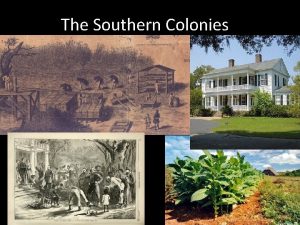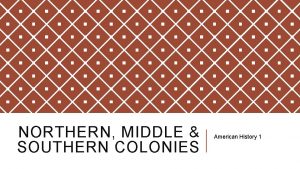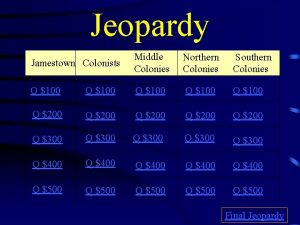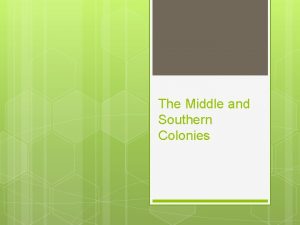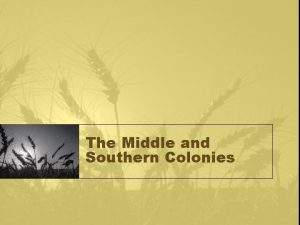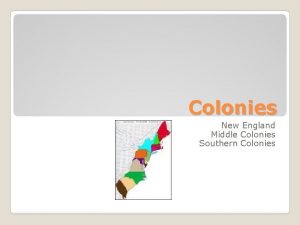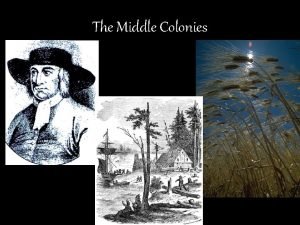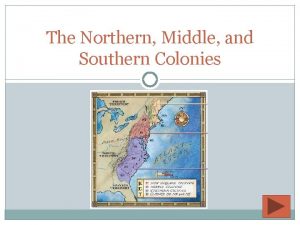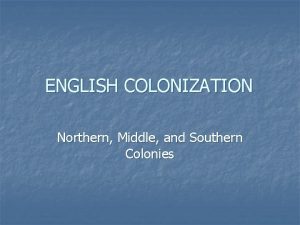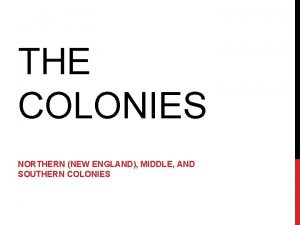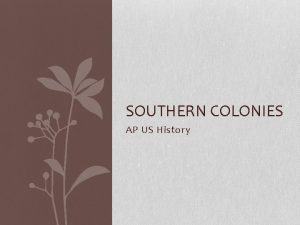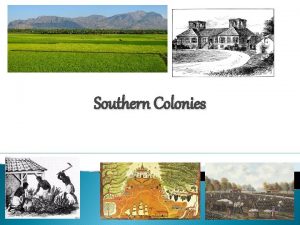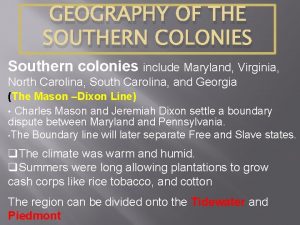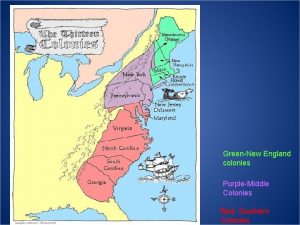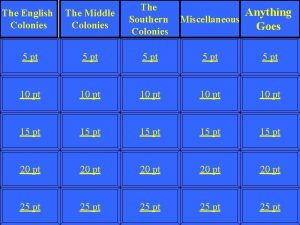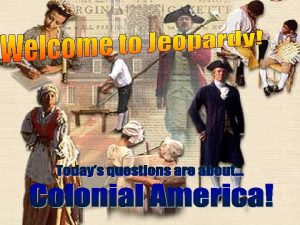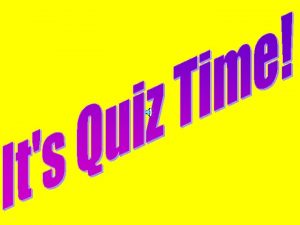THE COLONIES NORTHERN MIDDLE AND SOUTHERN COLONIES COLONIES






































- Slides: 38

THE COLONIES NORTHERN, MIDDLE, AND SOUTHERN COLONIES

COLONIES & CHARTERS • Colony: a group of people in one place who are ruled by a parent country elsewhere • Charter: a written document granting land the authority to set up a government

LIST OF COLONIES • New England Colonies • New Hampshire • Massachusetts • Rhode Island • Connecticut • Middle Colonies • New York • New Jersey • Pennsylvania • Delaware • Southern Colonies • Maryland • Virginia • North Carolina • South Carolina • Georgia

NEW ENGLAND COLONIES • New Hampshire • Massachusetts • Connecticut • Rhode Island (

NEW ENGLAND CULTURE • A diversified economy developed in the North with a focus on trade, shipbuilding, furs, fishing, and iron production. • Industries led to a growth of cities and the problems associated with cities: • • Sanitation • Overcrowding Merchants and Business Owners were the most powerful members of society. • The Puritans in the New England Colonies were less tolerant of other religious groups. • Rocky Soil and cold weather prevented heavy farming in New England. Instead, settlers only had small subsistence farms.

NEW ENGLAND Massachusetts • Pilgrims founded Plymouth in 1620 as a joint-stock company; Puritans founded Boston in 1630 for religious freedom • Leaders: John Winthrop • Massachusetts was a theocracy—religious beliefs served as law and religious leaders had the most authority; Mayflower Compact created by the Pilgrims as the first signed agreement holding democratic principles • Agriculture (fishing, corn, livestock), Manufacturing (lumbering, shipbuilding) Rhode Island • Founded 1636 by Roger Williams as a haven for the Baptists • Advocated for fair treatment of the Native Americans and some religious tolerance after he and Anne Hutchinson were exiled • Agriculture, fishing, manufacturing (lumbering) and distilleries

NEW ENGLAND Connecticut • Founded 1636 by Thomas Hooker after he left Massachusetts in search of more freedom from Puritans • Formed the Fundamental Orders of Connecticut-the first Constitution in the western world • Agriculture (wheat, corn, fishing) New Hampshire • Broke away from Massachusetts in 1638 by John Mason; further est. by John Wheelwright • Problems with Massachusetts • Agriculture (potatoes, fishing), Manufacturing (textiles, shipbuilding)

MIDDLE COLONIES • New York • Pennsylvania • New Jersey • Delaware (New Pennies New Dimes)

MIDDLE COLONIES CULTURE • • The Middle Colonies had the most fertile soil in 13 colonies. They were referred to as the Bread Basket Colonies because many different types of grain were produced in the area. Immigration in 1700’s led to a diverse population. Haven for religious minorities: • Quakers • Methodists • Moravians

MIDDLE COLONIES New York • Founded 1626 by Peter Minuit, named for King Charles II’s brothers, the Duke of York & Albany • Religious toleration, trade and profits for king • Agriculture, trade and export, metal working Pennsylvania • Founded 1682 by William Penn, a Quaker seeking religious freedom • Non-Quakers (Catholics, Lutherans, Jews and others) were allowed to practice their religion freely • Agriculture, trade, iron work

MIDDLE COLONIES New Jersey • Founded 1664 by Lord Berkeley and Sir George Carteret, proprietors of England • Religious toleration • Traded agricultural products and natural resources including cattle, grain, rice, indigo, wheat Delaware • Founded 1638 by Peter Minuit and the New Sweden Co. • Used area for access to the Atlantic Ocean • Trade and manufacturing; profits=goal

SOUTHERN COLONIES • Maryland • Virginia • North Carolina • South Carolina • Georgia (My Vehicle Needs Some Gas)

SOUTHERN COLONIES CULTURE • Fertile soils allowed the southern colonies economies to focus on the plantation model • Produced Cash Crops—plants grown for profit, not subsistence (cotton, tobacco, etc. ) • Wealthy Planters and Landowners dominated economic, social and political life • Plantations demanded more workers than immigration and indentured servants provided

SOUTHERN COLONIES Virginia • Founded in 1607 by the Virginia Co (joint-stock); suffered bankruptcy and turned into a crown/royal colony • Leaders: John Smith, John Rolfe • First permanent European settlement in present-day America; tobacco saved the colony from demise • Agriculture (cash crop: tobacco, wheat, corn) Maryland • Founded in 1633 by Lord Baltimore as a haven for Catholics and named after Queen Mary • The assembly of the Maryland colony created the Maryland Toleration Act, protecting the rights of religions in Maryland, (England was not in support of this decision) • Agriculture, trade, iron working

SOUTHERN COLONIES Georgia • Founded 1732 by James Oglethorpe as a debtor state and a buffer between the British and Spanish/French settlements • Oglethorpe wanted to reform the prison system by offering prisoners (usually Protestant) opportunities for redemption • Agriculture (cash crops) North & South Carolina • Founded as one unit in 1653 by VA colonists, then in 1663 was granted a Charter by King Charles to the 8 Lord’s Proprietors • Separate into separate states in 1729 due to disagreements in gov’t; sold back to the British crown to become a royal colony • Agriculture (cash crops)

WORKFORCE Originally, Southern Colonies used Indentured Servants to work on plantations and farms. • agreed to work for planters in the colonies in exchange for passage to America • serve for a predetermined number of years (usually 7 years) and then gain freedom at the end of that time. • African Slaves became the primary source of plantation labor; served lifelong terms and did not choose to come to the colonies.


THE MIDDLE PASSAGE • African Slave traders from the West Coast of Africa captured other Africans from the interior of Africa • Only ½ of Slaves survived the forced migration • African Slave Traders gave Slaves to the Europeans in exchange for weapons and other goods. It is estimated that 20 -30% of slaves died en route to the Americas on the Middle Passage

TRIANGULAR TRADE

SOCIETY IN COLONIAL AMERICA 1. Who was the Upper Class of society? Describe their life. 2. Who was the Middle Class of society? Describe their life. 3. Who was the Lower Class of society? Describe their life. 4. How easy do you think it was to move from one society to another? Explain. 5. Using information discussed earlier in class, how do these sources compare with our “American Dream” ideals?

WHO HAS CONTROL? MERCANTILISM AND NAVIGATION ACTS • BIG QUESTION: The colonies begin to prosper…Who gets the wealth? Who deserves to rule? • Mercantilism: an economic system in which nations seek to increase their wealth and power by obtaining large amounts of gold and silver by est. a favorable balance of trade • Colonies’ purpose: satisfy the mother country • England compared to other European countries: more lax in policies…until colonies grow richer

MERCANTILISM: HOW DO YOU ENFORCE IT?

NAVIGATION ACTS • 1651: England’s Parliament passed a series of laws known as the Navigation Acts • Purpose: restrict the colonies shipping and trade for England’s economic benefit • Ships, destinations, crews, goods: all strictly regulated by the English • If you trade w/ other nations, had to be shipped to England first to handle taxation • Encouraged to focus on raw materials • LIST: England/Colonists: Positives? Negatives? • Problem? The colonies were developing a spirit of selfdetermination • Not yet a problem; Acts not strictly enforced

COLONIES COMPARED TO ENGLAND Were the colonies better off or worse off? • Economic lifestyle (+/-) • Native Americans (+/-) • Higher standard of living (+/-) • Religious and political freedoms (+/-) • More economic opportunity “American Dream” (+/-) • Same rights as the British (+/-) • 3000 miles away from the King (+/-)

‘ELLO GOV’NAH! Choose your colony 1. Host a convention of your peers where you will extol the virtues of life, commerce, and natural resources that make your colony a great place to live (accurate info) 2. BE CONVINCING! Entertain us with your writing skills. 3. Write a keynote address to be delivered at the governor’s convention (classroom audience)

AMERICA THE BEAUTIFUL Review: What is the American Dream? (yes, there is a true definition) Explain in your own words (think political, economic, social, religious, etc) American Dream: the national ethos (ethics) of the United States that includes 5 specific ideals (Democracy, Rights, Liberty, Opportunity, and Equality) How did we come to this decision?

ENLIGHTENED MATCHING/DEFINE Republicanism/ Civic Virtue Hobbes “Majority isn’t the best” Montesquieu Natural Laws, Inalienable Rights Plato Separation of Government Voltaire Social Contract Theory Aristotle Concern “For the Common Good” Machiavelli Give up Rights for the Collective Free Speech/Criticism Locke Rousseau

ENLIGHTENED ANSWERS Republicanism/ Civic Virtue Machiavelli “Majority isn’t always the best” Rousseau Natural Laws, Inalienable Rights Locke Separation of Government Montesquieu Social Contract Theory Hobbes Concern “For the Common Good” Aristotle Give up Rights for the Collective Free Speech/Criticism Plato Voltaire

ENLIGHTENED INFLUENCES 1. Plato: believed that government should create good for all collectively and that all individuals needed to give up things for the collective good of all citizens 1. Aristotle: Ideal governments should be concerned with the common good or common interest 1. Machiavelli: believed in "republicanism" and "civic virtue" where citizens act for the common good and they would put their selfish desires aside 1. Hobbes: believed man was naturally selfish and brutish, therefore requiring government; in this case an ABSOLUTE government; believed in social contract theory.

CON’T 5. Locke: Believed that all men are created equal and that people should have the freedom to act. Believed in the social contract theory, natural laws/rights, and people can overthrow their government. 6. Montesquieu: believed in separation of power and that there should be 3 branches of government: legislative, executive, and judicial (checks and balances). 7. Voltaire: supported the notion of free speech and criticizing powerful institutions (Catholic Church); also supported ending the slave trade 8. Rousseau: Agreed with Locke but didn't think that the majority would always act for the common good. Believed that the role of the government was to ensure that the common good was protected.

ENLIGHTENMENT IN AMERICA 1. Define Enlightenment in 3 -5 words. 2. Explain the political/social impact that the Enlightenment had on Europe and the New World. 3. Who was Roger Williams? How did he help shape a new vision for the New World? 4. What ideals influenced the beginnings of America? Are they still present today? 5. What is an Enlightened Despot? Give examples. 6. What is the greatest irony of the Enlightenment? Explain. 7. Why is the Enlightenment important to America’s history?

COLONIAL SET UP 1. Royal Colonies: Monarch selects the governor and appoints the members of the governor’s council (upper house). Qualified voters elect the colonial assembly (lower house). 8 colonies-who? GA, SC, NC, VA, NJ, NY, MA, NH 1. Proprietary Colonies: Proprietor selects the governor and eligible voters elect the colonial assembly. 3 colonieswho? Delaware, Maryland, Pennsylvania 1. Self-Governing Colonies: Colonists directly or indirectly elect governor and both members of legislature. 2 colonies-who? Connecticut, Rhode Island


ACTIVITY Draw this table in your notebook Fill in the date for each event. In blue book: read p. 2324 for information. Add the following to your list: Mayflower Compact, Town Meetings, and Fund. Orders of Conn. Cut the seven icons from your handout, and tape each icon into your table for the event it best represents. Then describe their effect on American Rights/Gov’t.


CONTINUED Mayflower Compact, 1620: pledge to further the general good of the colony, enact equal laws, and set an example of direct democracy, rule by the majority, and fair treatment under the law Town Meetings: centered around the church; only free, property owning men participated; example of direct democracy and training for self-government Fundamental Orders of CT, 1639: Thomas Hooker, first official, successful written constitution in the New World; rested upon the consent of the governed (with property)

QUESTIONS TO CONSIDER 1. What type of economic system existed in colonial America? 2. Who profited? Is this fair? Explain. 3. How does the Enlightenment and the “American Dream” affect this system? 4. Preview: What is revolution?

WRAPPING IT UP Review Sheet posted on website! Things to know: TEST ON FRIDAY 1. Pre-Columbian Americas; fact v. myth 2. Factors that influenced Europeans Exploration and Colonization 3. Geography/Topography: effect on settlement and creation of different regions in the colonies 4. Migration: Reasons, Trends, Problems, Society 5. Tensions in the Colonies: Economics and Enlightenment 6. Decisions that impacted early America
 Middle colonies date founded
Middle colonies date founded When was the new england colonies founded
When was the new england colonies founded Southern colonies
Southern colonies North middle and southern colonies
North middle and southern colonies Compare and contrast 13 colonies
Compare and contrast 13 colonies New england, middle and southern colonies comparison chart
New england, middle and southern colonies comparison chart Spring summer winter fall
Spring summer winter fall Southern states of america
Southern states of america Southern words vs northern words
Southern words vs northern words Northern hemisphere islands
Northern hemisphere islands Southern words vs northern words
Southern words vs northern words New england mid atlantic and southern colonies
New england mid atlantic and southern colonies Religion southern colonies
Religion southern colonies Characteristics of the southern colonies
Characteristics of the southern colonies Southern colonies
Southern colonies Economy of southern colonies
Economy of southern colonies Southern colonies
Southern colonies Specialization and interdependence
Specialization and interdependence Southern colonies founder
Southern colonies founder Southern colonies
Southern colonies Colony brochure project
Colony brochure project Economy of southern colonies
Economy of southern colonies What country
What country Sports in colonial america
Sports in colonial america Chapter 3 lesson 4 the southern colonies
Chapter 3 lesson 4 the southern colonies Southern colonies society/culture
Southern colonies society/culture Southern colonies
Southern colonies Southern colonies definition
Southern colonies definition Middle colonies religion
Middle colonies religion Middle colonies physical characteristics
Middle colonies physical characteristics Southern colonies geography
Southern colonies geography Southern colonies
Southern colonies Economy of middle colonies
Economy of middle colonies Melissa dorsett
Melissa dorsett Northern middle school somerset ky
Northern middle school somerset ky Important facts about the middle colonies
Important facts about the middle colonies Middle colonies economy
Middle colonies economy Geography of middle colonies
Geography of middle colonies What did the middle colonies do
What did the middle colonies do
